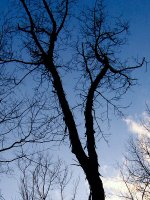More About Trees and Plants... Life in The Upper South...
 This shagbark hickory tree grows in the woods near a small streambed that carries water downhill when it rains. The bark of the shagbark is unique and easily recognized; it appears to be peeling away from the tree's trunk. One of my tree books (Native Trees, Shrubs, and Vines for Rural and Urban America by Gary L. Hightshoe) describes the bark as "vertical exfoliating plates, curl outwards at ends, shaggy appearance."
This shagbark hickory tree grows in the woods near a small streambed that carries water downhill when it rains. The bark of the shagbark is unique and easily recognized; it appears to be peeling away from the tree's trunk. One of my tree books (Native Trees, Shrubs, and Vines for Rural and Urban America by Gary L. Hightshoe) describes the bark as "vertical exfoliating plates, curl outwards at ends, shaggy appearance." In addition to the shagbark, several other hickories are native to Kentucky -- mockernut hickories, pignut hickories, bitternut hickories, and pecans. Hickory nuts are a reliable food source for squirrels because hickories bear nuts every year, unlike some oaks that only bear acorns biennially. I read an article in a farm magazine several years ago that recommended planting hickories if you want more squirrels to hunt.
The best way to get a hickory tree is to plant the nut. They have a deep taproot so they're hard to dig up and transplant unless they're very young. Shagbarks are slow growing (as are all hickories) but they can live as long as 250 years.
Hickory is a heavy, strong, resilient wood that was once used for wagon axles, baseball bats, and skis. It is well known as an excellent firewood that burns long and hot, leaving a long-lasting bed of coals. This site rates hickory as the hottest-burning and most dense of 27 native hardwoods and softwoods.
No comments:
Post a Comment